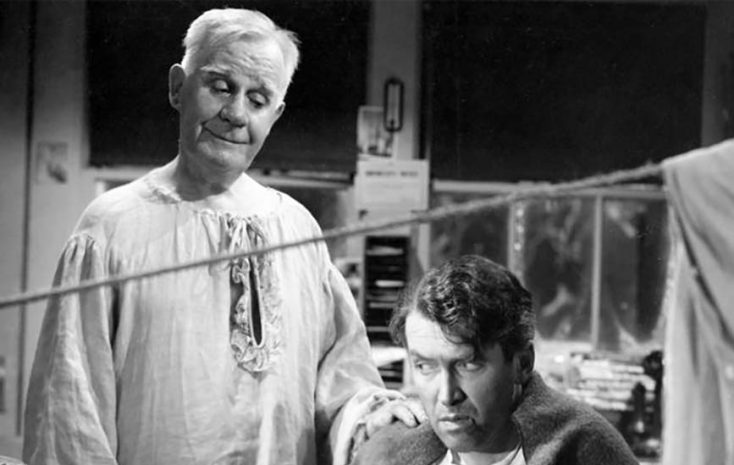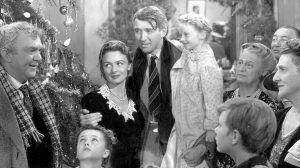By JUDY SLOANE
Front Row Features
HOLLYWOOD-What would the world be like if “It’s a Wonderful Life” hadn’t been ‘born’? We would never have known George Bailey or the other inhabitants of Bedford Falls. Never had the opportunity to experience the story of a small-town businessman whose most heartfelt desire to run away and explore far exotic places is never fulfilled. Instead, in frustration and anger, he takes over this father’s business, battles with the villainous local banker, Mr. Potter (Lionel Barrymore,) and marries his true love, Mary (Donna Reed,) raising four children. But despite all his good deeds, Bailey, driven to despair, contemplates suicide. Enter Clarence Oddbody (Henry Travers), angel second-class, who is still waiting to earn his wings. He grants George Bailey his wish – he has never been born. This brilliant concept gives George, and the audience, the opportunity to see how interconnected we all are and how important every person’s life is.
In 1939, Philip Van Doren Stern was inspired to write a short story called “The Greatest Gift.” He privately printed over 100 copies and sent them to family and friends instead of a Christmas card. It became so popular he published the holiday fable.
It was the first movie director/writer Frank Capra and star James Stewart did following World War II.
In January 1998, I talked with Frank Capra’s son, producer Frank Capra Jr. along with two of the young actors who portrayed Stewart’s children in the movie, Karolyn Grimes, Zuzu, who said one of the most famous lines in the film, ‘Look Daddy, teacher says every time a bell rings an angel gets his wings.’ And Jimmy Hawkins, Tommy, who has written two books about the film, The It’s a Wonderful Life Trivia Book and It’s a Wonder Life: The 50th Anniversary Tribute. Frank Capra passed on in 1991 and his son Frank Capra Jr. died in 2007. Five months before I did the interviews for this feature, James Stewart passed on, July 2, 1997 at 89 years old.
Judy Sloane: Frank, How did your father get involved with the movie?
Frank Capra Jr.: My dad wasn’t sure he could make another film as he had been away 4 ½ years (serving in the war under the Army Signal Corps.) At first he said, “Maybe I should make a western, something simple. He looked at some material but nothing quite suited him. Then my dad read “The Greatest Gift,” and when he read that story, he got so excited because he felt it was such a unique concept – being able to see what the world would have been like if you had never been born.
Judy Sloane: Your dad was one of the writers of the screenplay. Why did he change the title to “It’s a Wonderful Life?”
Frank Capra Jr.: He might have felt that “The Greatest Gift” gave the wrong inference, as the focus of the film was what George Bailey’s life was; he liked the idea of his life being a part of the title.
Judy Sloane: How did James Stewart end up playing George Bailey?
Frank Capra Jr.: I know my father felt that James was perfect for the part; the perfect all-American, intelligent mid-westerner, who was smart enough to feel the loss of his life slipping away.
Judy Sloane: Your dad assembled one of the greatest supporting casts in movie history for this film.
Frank Capra Jr.: Some directors find actors difficult to deal with. My father loved his actors and they in turn loved him because he gave them so much support. A lot of his character actors in “It’s a Wonderful Life” are actors that have worked in many of his pictures. It’s such a rich film because he would pick his actors and he would let them do their thing. He felt that in his storytelling, if an audience believed the little people in the movie then they would believe the big stuff. They would swallow some very strange things, including an angel.
Judy Sloane: Karolyn, how did you get the role of Zuzu?
Karolyn Grimes: I really don’t remember much about it. There was a little accident that happened. At the time I didn’t know what was going on, but later I heard my mother discussing it. There was a woman who was a big stage mother and she ‘accidentally’ spilled some coffee on my dress. She might have felt threatened by me, I don’t know. It turns out what happened, rather than make me feel embarrassed that I had to go in there with a soiled dress, gave me something to talk about. I chatted away forever. I don’t know if that influenced them.
Judy Sloane: Jimmy, what do you remember about auditioning for Tommy?
Jimmy Hawkins: I remember Capra squatting down and talking to me eye-to-eye, telling me exactly what he wanted me to do in each scene and then asking me if I understood what he meant.
Judy Sloane: You have a lovely story about the movie’s villain, played by Lionel Barrymore, and James Stewart.
Jimmy Hawkins: Lionel Barrymore was a real nice man. He was instrumental in getting Jimmy Stewart on the right track. While doing the film Stewart, who had seen what the war did to people, said that he thought being an actor was frivolous. Barrymore told Stewart, ‘You are making a difference. People come and get away from all their problems when they see you on the screen. This is a wonderful gift that you have.’ It changed Jimmy Stewart’s outlook on the rest of his career. Maybe having this gift of being a great actor meant something.
Judy Sloane: Filming started at Beverly Hills High School on April 13, 1946. What did your father tell you about that day?
Frank Capra Jr.: It’s a very interesting example of what a director can do. When they were there, ready to shoot, someone told my dad that the floor opened and that there was a pool underneath. He didn’t know that. They had never talked about it because they were there doing a high school dance. He said, ‘Wow, I’ve got to use that somehow.’ And so he redesigned that scene a little bit so that at the end of it they all go into the pool. A lot of that was dreamed up on the set.
Judy Sloane: What do you remember about working with Jimmy Stewart?
Karolyn Grimes: I remember in the scene where I was in my bedroom with the rose, and the actual line about giving it a drink. But most of all I remember that Jimmy Stewart was very patient with me, because sometimes kids can goof and they don’t remember their lines, and it has to be shot over. I’ll never forget that he taught me that it was alright to make mistakes.
Jimmy Hawkins: I remember the scene when Jimmy Stewart comes home in a rage and grabs me. I was sitting on his lap and I remember rehearsing that and shooting it. The Santa mask I was wearing kept hiking up around my neck and it was real rough inside and every time he’d pull me in, the inside of the mask scraped my cheek. I kept wondering, “When is this man going to stop this?” because it was hurting. Yet I knew that I was supposed to act like it was the first time he ever did it. That was instilled someplace in me.
Judy Sloane: Perhaps the most famous scene in the movie is when the townspeople arrive at George Bailey’s home, showering him with gifts and money to help him back on his feet. What do you remember about shooting that scene?
Jimmy Hawkins: I thought it was kind of fun. When Donna Reed clears the card table and puts the basket on it, you can see me laughing with the other kids. I remember the excitement of it.
Karolyn Grimes: They filmed that scene in little sections. I remember all the people and the pocket watch the man gave me – I remember holding onto that and looking at it. It seemed like Capra had me really focused on every single thing, like Violet coming in and saying, ‘I don’t need this money.” I rolled my eyes around like, ‘Oh God!’ I didn’t see the bell ring; that was a special effect that was put in later. The whole scene was well orchestrated by Capra.
Judy Sloane: Jimmy, you went on to work on “The Donna Reed Show” for eight years. I read that your friendship with her lasted until her death.
Jimmy Hawkins: The last time I saw her it was Christmas Day, 1985. I came over to her house to give her an “It’s a Wonderful Life” ornament and she pointed to where she wanted it on the tree, and then I talked with her a little longer. She was failing. She was a very special lady. (She passed on January 14, 1986.)
Judy Sloane: How did you feel when you heard that James Stewart had passed on?
Karolyn Grimes: I have to say that I was thankful in a way, because he was ready. He missed his wife Gloria a great deal, he had given up, there wasn’t much there for him and he was waiting. It was a blessing for him to be able to have the opportunity to join her again.
Jimmy Hawkins: I felt very sad. A week before he passed away, I sent him a bunch of my books to sign for an upcoming charity. His office called and said, ‘He signed them, come and pick them up.’ So I felt that through the books and the signing, he was still giving. He was always giving to me with is time, just sitting down and shooting the breeze. He was a real nice man and he will be missed. But thank God for his films – his talent will live on.
Judy Sloane: Do you think your father knew he was making a classic motion picture?
Frank Capra Jr.: He knew in his mind that he was at the peak of his career. He’d gone from comedies to serious social issues, and he knew that he was successful telling stories. I think he felt that he was at the top of his game. He was very excited about making a mainstream movie again, and I think he knew that this was a wonderful germ of an idea. I don’t know if he thought it was going to be a huge success, but I think he knew it was going to be highly personal. In the end, my father lived to see this tremendous resurgence of the film as it took on a life of its own on television.
Footnote: Many years ago I asked Jimmy Stewart how he would like to be remembered, and he replied: “Going back to Frank Capra and his values, I’d like to feel that I abided by those. I’d like to be remembered as someone who believed in hard work, love of community, love of family and love of God.”
Portions of this article were first published in Film Review Magazine






